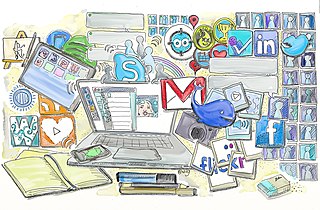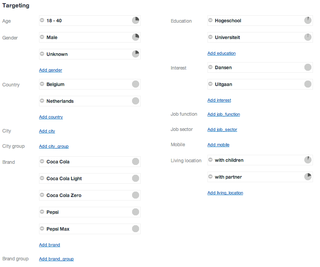A social network is a theoretical concept in the social sciences, particularly sociology and anthropology, referring to a social structure made up of individuals or organizations.
Contents
Social network may also refer to:
A social network is a theoretical concept in the social sciences, particularly sociology and anthropology, referring to a social structure made up of individuals or organizations.
Social network may also refer to:
Network, networking and networked may refer to:
An online community, also called an internet community or web community, is a community whose members interact with each other primarily via the Internet. Members of the community usually share common interests. For many, online communities may feel like home, consisting of a "family of invisible friends". Additionally, these "friends" can be connected through gaming communities and gaming companies. Those who wish to be a part of an online community usually have to become a member via a specific site and thereby gain access to specific content or links.
Social software, also known as social apps or social platform includes communications and interactive tools that are often based on the Internet. Communication tools typically handle capturing, storing and presenting communication, usually written but increasingly including audio and video as well. Interactive tools handle mediated interactions between a pair or group of users. They focus on establishing and maintaining a connection among users, facilitating the mechanics of conversation and talk. Social software generally refers to software that makes collaborative behaviour, the organisation and moulding of communities, self-expression, social interaction and feedback possible for individuals. Another element of the existing definition of social software is that it allows for the structured mediation of opinion between people, in a centralized or self-regulating manner. The most improved area for social software is that Web 2.0 applications can all promote co-operation between people and the creation of online communities more than ever before. The opportunities offered by social software are instant connections and opportunities to learn.An additional defining feature of social software is that apart from interaction and collaboration, it aggregates the collective behaviour of its users, allowing not only crowds to learn from an individual but individuals to learn from the crowds as well. Hence, the interactions enabled by social software can be one-to-one, one-to-many, or many-to-many.
Social computing is an area of computer science that is concerned with the intersection of social behavior and computational systems. It is based on creating or recreating social conventions and social contexts through the use of software and technology. Thus, blogs, email, instant messaging, social network services, wikis, social bookmarking and other instances of what is often called social software illustrate ideas from social computing.
Computer-supported collaboration research focuses on technology that affects groups, organizations, communities and societies, e.g., voice mail and text chat. It grew from cooperative work study of supporting people's work activities and working relationships. As net technology increasingly supported a wide range of recreational and social activities, consumer markets expanded the user base, enabling more and more people to connect online to create what researchers have called a computer supported cooperative work, which includes "all contexts in which technology is used to mediate human activities such as communication, coordination, cooperation, competition, entertainment, games, art, and music".

A social networking service or SNS is a type of online social media platform which people use to build social networks or social relationships with other people who share similar personal or career content, interests, activities, backgrounds or real-life connections.

Personal web pages are World Wide Web pages created by an individual to contain content of a personal nature rather than content pertaining to a company, organization or institution. Personal web pages are primarily used for informative or entertainment purposes but can also be used for personal career marketing, social networking with other people with shared interests, or as a space for personal expression.

User-generated content (UGC), alternatively known as user-created content (UCC), is generally any form of content, such as images, videos, text, testimonials, and audio, that has been posted by users on online content aggregation platforms such as social media, discussion forums and wikis. It is a product consumers create to disseminate information about online products or the firms that market them.

Social media are interactive technologies that facilitate the creation and sharing of content, ideas, interests, and other forms of expression through virtual communities and networks. Social media refers to new forms of media that involve interactive participation. While challenges to the definition of social media arise due to the variety of stand-alone and built-in social media services currently available, there are some common features:
Social media optimization (SMO) is the use of a number of outlets and communities to generate publicity to increase the awareness of a product, service brand or event. Types of social media involved include RSS feeds, social news, bookmarking sites, and social networking sites such as Facebook, Instagram, Twitter, video sharing websites, and blogging sites. SMO is similar to search engine optimization (SEO) in that the goal is to generate web traffic and increase awareness for a website. SMO's focal point is on gaining organic links to social media content. In contrast, SEO's core is about reaching the top of the search engine hierarchy. In general, social media optimization refers to optimizing a website and its content to encourage more users to use and share links to the website across social media and networking sites.

Digital marketing is the component of marketing that uses the Internet and online-based digital technologies such as desktop computers, mobile phones, and other digital media and platforms to promote products and services. Its development during the 1990s and 2000s changed the way brands and businesses use technology for marketing. As digital platforms became increasingly incorporated into marketing plans and everyday life, and as people increasingly used digital devices instead of visiting physical shops, digital marketing campaigns have become prevalent, employing combinations of search engine optimization (SEO), search engine marketing (SEM), content marketing, influencer marketing, content automation, campaign marketing, data-driven marketing, e-commerce marketing, social media marketing, social media optimization, e-mail direct marketing, display advertising, e-books, and optical disks and games have become commonplace. Digital marketing extends to non-Internet channels that provide digital media, such as television, mobile phones, callbacks, and on-hold mobile ringtones. The extension to non-Internet channels differentiates digital marketing from online marketing.
A professional network service is a type of social network service that focuses on interactions and relationships for business opportunities and career growth, with less emphasis on activities in personal life.

Content marketing is a form of marketing focused on creating, publishing, and distributing content for a targeted audience online. It is often used by businesses in order to achieve the following goals: attract attention and generate leads, expand their customer base, generate or increase online sales, increase brand awareness or credibility, and engage an online community of users. Content marketing attracts new customers by creating and sharing valuable free content as well as helps companies create sustainable brand loyalty, provides valuable information to consumers, and creates a willingness to purchase products from the company in the future.

Targeted advertising is a form of advertising, including online advertising, that is directed towards an audience with certain traits, based on the product or person the advertiser is promoting. These traits can either be demographic with a focus on race, economic status, sex, age, generation, level of education, income level, and employment, or psychographic focused on the consumer values, personality, attitude, opinion, lifestyle and interest. This focus can also entail behavioral variables, such as browser history, purchase history, and other recent online activities. The process of algorithm targeting eliminates waste.
Social network advertising, also known as "social media targeting," is a group of terms that are used to describe forms of online advertising and digital marketing that focus on social networking services. One of the significant benefits of this type of advertising is that advertisers can take advantage of the users' demographic information, psychographics and other data points to target their ads appropriately.
Social information processing is "an activity through which collective human actions organize knowledge." It is the creation and processing of information by a group of people. As an academic field Social Information Processing studies the information processing power of networked social systems.

Social media marketing is the use of social media platforms and websites to promote a product or service. Although the terms e-marketing and digital marketing are still dominant in academia, social media marketing is becoming more popular for both practitioners and researchers. Most social media platforms have built-in data analytics tools, enabling companies to track the progress, success, and engagement of ad campaigns. Companies address a range of stakeholders through social media marketing, including current and potential customers, current and potential employees, journalists, bloggers, and the general public. On a strategic level, social media marketing includes the management of a marketing campaign, governance, setting the scope and the establishment of a firm's desired social media "culture" and "tone".
Social network is a theoretical concept in the social sciences, particularly sociology and anthropology, referring to a social structure made up of individuals or organizations. It may also refer to:
Social selling is the process of developing relationships as part of the sales process. Today this often takes place via social networks such as LinkedIn, Twitter, Facebook, and Pinterest, but can take place either online or offline. Examples of social selling techniques include sharing relevant content, interacting directly with potential buyers and customers, personal branding, and social listening. Social Selling is gaining popularity in a variety of industries, though it is used primarily for B2B (business-to-business) selling or highly considered consumer purchases. C2C companies have been using social selling techniques since far before the Internet existed. B2B and B2C companies are now adopting many of those techniques as they are translated to social media platforms.
Social profiling is the process of constructing a social media user's profile using his or her social data. In general, profiling refers to the data science process of generating a person's profile with computerized algorithms and technology. There are various platforms for sharing this information with the proliferation of growing popular social networks, including but not limited to LinkedIn, Google+, Facebook and Twitter.